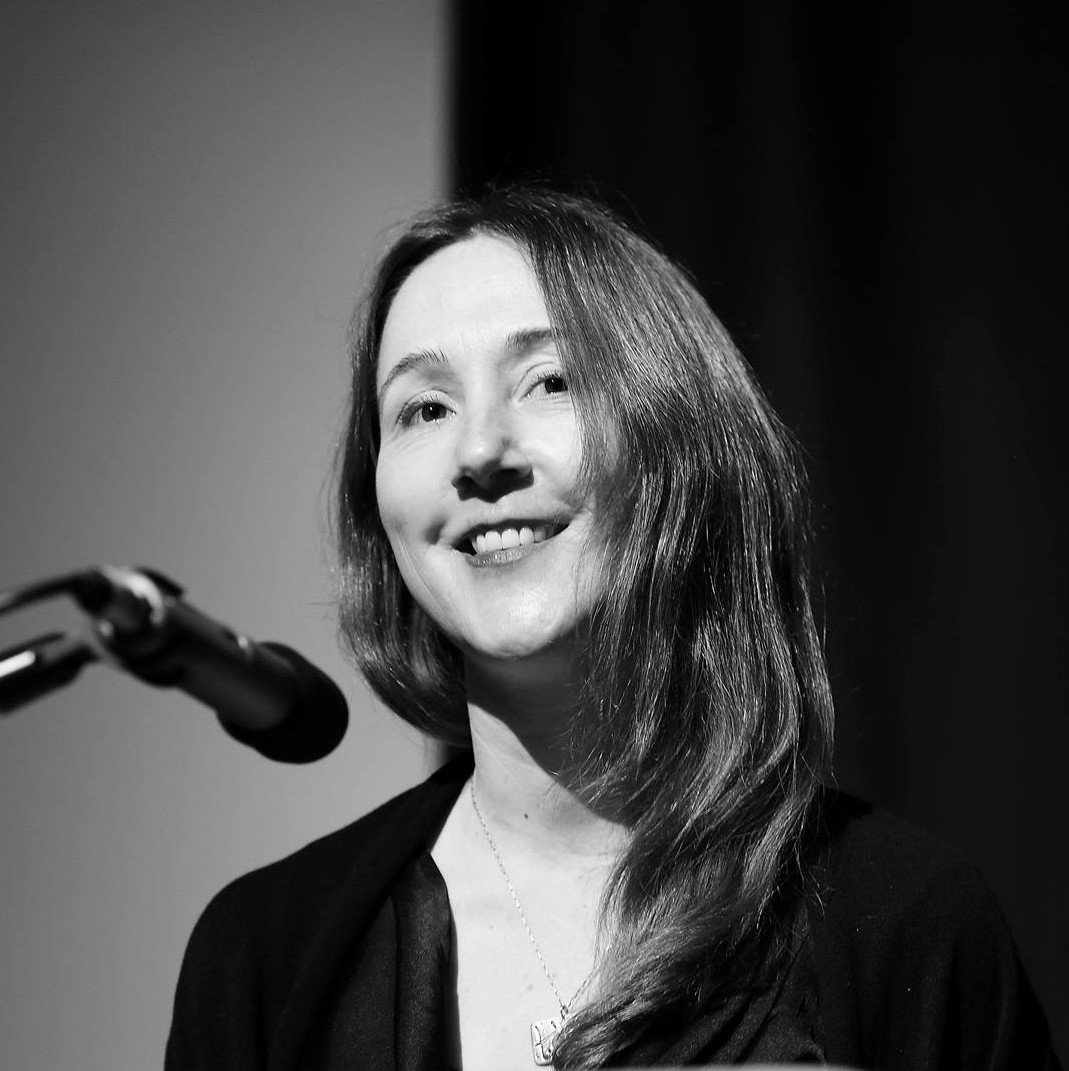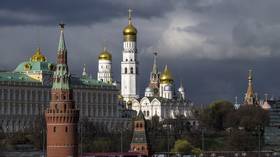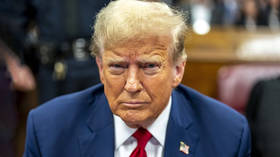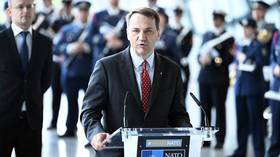The real Syrian moderates: voices of reason
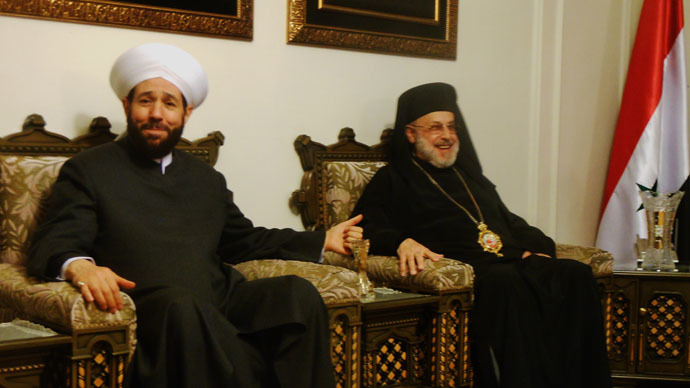
While the Western-led, anti-Assad bloc mind-blowingly speaks of arming non-existent “moderates” to fight in Syria, they also continue to demonize and silence the very voices that offer a true means of bringing peace and stability back to the region.
Two of these voices are: Political and Media Adviser to President al-Assad, Dr. Bouthaina Shaaban; and Syria's highest Muslim official and scholar, Grand Mufti Dr. Ahmad Badr Al-Din Hassoun. Both are highly-educated and convey messages of dialogue, understanding, and peace. And both seemingly terrify the West, which has been quick to sanction and deny them visas, lest the anti-Syria lies and propaganda be challenged before a Western audience.
From February 24-26, 2015, the US delegation I accompanied met a number of important Syrian figures, including Mufti Hassoun and Dr. Shaaban.
Dr. Shaaban is known to her American friends as “the bridge,” she says. “I always wanted to be a bridge between Syria and Western cultures.” She has lived abroad, earning a PhD in English literature from Warwick University, on a Fulbright scholarship at Duke University, and later as professor at Eastern Michigan University.
She speaks affectionately and respectfully of Americans: “I enjoyed American people, their hospitality and kindness.” Affection for the people aside, she is heavily critical of the US government and allies' prolonged attack on Syria.
Not only has the West backed and trained terrorists in Syria, the so-called “opposition” they hand-picked to represent Syrians can't even pretend to do so. “They adopted personalities who haven't lived in Syria for 30 years! Further, they took the wrong step in closing embassies, instead of communicating with us and observing from the ground. In the name of 'democracy' and 'human rights' they are destroying our country.”
As for countries neighboring and near Syria, Dr. Shaaban notes:
“Turkey, Saudi Arabia, Qatar...they are the spearhead of what has happened here.” She points out that beyond President Erdogan's suits and smiles; he is a staunch supporter of the Muslim Brotherhood, which has long sought to disrupt Syria. Add to the fray Saudi Arabia's Wahhabi extremism and the result is the “moderate” organ-eating, head-chopping, crucifying mercenaries plaguing Syria, from the so-called FSA to al-Nusra to Da'esh (ISIS). “With external support and financing, and an over 800 kilometer border with Turkey, it's very difficult to stop the flow of terrorists.”
In our meeting, Shaaban paints a picture of the Syria that existed prior to this multi-regime attack on its sovereignty.
“Syria was formerly one of the fastest developing countries in the world, and one of the safest. We have free education and health care. We did not know poverty; we grew our food and produced our own clothing. At universities, 55 percent of the students were women.” Already, these are points the West would prefer remain unheard, points which dispute the lies that Syrians were living in miserable oppression prior to the faux-revolution, and also which could not be said about NATO's Gulf state allies.
“The souk of Aleppo was the most beautiful. It's now rubble, they destroyed it. In whose interest is it to destroy this heritage? Who is the beneficiary of this? I'm sure if the American public knew the truth about what is happening in Syria they wouldn't accept Syrian people being slaughtered.”

Further points the ‘Axis-of-Destruction’ would care to keep under wraps: “You have hundreds of thousands of widows, most without any income because they've lost their main provider and are left to care for their children—theirs is the better situation, in secure government-ruled areas. In areas where armed gangs rule, women are being raped, sold, or killed. Also, in refugee camps in Jordan, women are being raped and sold. Women and children are paying the highest price.”
Unsurprisingly, given the West's pivotal role in fomenting the Syrian upheaval, Dr. Shaaban's name was among the first to be put on America's persona non grata list during this manufactured “Syrian crisis”.
“I find it strange they consider me dangerous,” she says. But it's not that they find her, per se, dangerous, just they would like her to shut up. “At the beginning of the crisis, they tried to buy me,” she says, noting they tried to play the “come to a civilized place” card. Dr. Shaaban is similar to Syria's Permanent Representative to the UN, Dr. Bashar al-Ja'afari, in her sharp intellect and quick responses, and in her use of literary references to shoot down Western belligerence.
“I told them, 'We have baths which are over 1,000 years old and still functioning. I studied Shelley: they didn't have baths 800 years ago in England. We did, we were having baths and coffee,'” she relates with a laugh. “Stop calling for us to be civilized. We are civilized!”
If Israel has any say in her ostracization, it may be Dr. Shaaban's continued advocacy for Palestinians (in addition to her strong anti-Imperialist Syrian voice) that makes her 'dangerous' to Israeli and Western interests. In her 2010 article, The Delegitimization of Israel, she noted:
“...What characterizes the first decade of this century is that the world has started to realize that the conflict in the Middle East is not a religious one, nor a war on terrorism as portrayed by Zionist propaganda. It is the result of a racist settler movement which deprives an ancient people, who lived on the land of their ancestors for thousands of years, from freedom. This is why Jews, Christians and Muslims have taken part in demonstrations against the racist wall of segregation and called for lifting the blockade of Gaza and staged sit-ins with the Palestinians in protest against killing children and demolishing homes.”
On the note of religion, Shaaban embodies the secular coexistence that is Syria. “I'm a Muslim, but I feel am partly Christian. I visit (Christian towns of) Saydnaya and Ma'loula. I celebrate Christmas, because it is something that I feel. There is an Arabic proverb which says: 'Differences don't mean that you don't love one another.' We each have our own different ways of life.”
She tells the story of a Jewish family from abroad who in 1999 visited Syria, went to their ancestral homes and were shocked to find graves of their ancestors untouched. This is Syria. In contrast, the West's imported, ever-circulating un-Islamic 'moderates' are actively destroying not only graves but any source of Syria's heritage they can get their bloodied hands on.
Mufti Hassoun calls his Greek Orthodox counterpart, Bishop Luca al-Khoury, his cousin and brother. “Our grandfathers, 1,400 years ago, were one family. My grandfather embraced Islam and his remained Christian.” He maintains that he, as Grand Mufti, serves the Syrian people, period. “In Syria, there are 23 million Christians, and 23 million Muslims. My title is Grand Mufti of the Syrian Arab Republic, not the Mufti of a particular denomination.”
In the media war on Syria, which insists sectarianism—which the Syrian people reject—this declaration is significant: in Syria, the ancient cultural fabric is rich and secular.
Unlike the Saudi Mufti - who has reportedly said “all churches in the Arabian Peninsula must be destroyed” - Mufti Hassoun is open-minded and committed to unity of people (not only the Syrian people) - to the point of making light of some religious institutions' use of power: “God, is not a Christian or Muslim or a Jew. God is for all of us. Jesus was not a Catholic, nor an Orthodox, nor a Protestant. And Mohammed was not a Wahhabi, not a Sufi. We as religious clerics have divided you into sects, so that we become leaders of each sect. We whisper in the ears of politicians: if you support us, we will repay the favor.”
While Dr. Hassoun does not wield his influence in such a way, it is rare that a religious authority figure so candidly speaks of this potential abuse of power over their people. So what does he whisper in people's ears? He's not shy about it, he doesn't whisper:
Forgiveness. Understanding. Unity. Love. And like Shaaban (and most Syrians), solidarity with Palestinians in their struggle for liberation, and resistance to Israeli occupation, to extremism, and to the foreign invasion of secular Syria. At an Islamic Unity Conference in Tehran in January 2015, Hassoun urged Muslim leaders and scholars to unify, and highlighted, “the most dangerous thing we witness today is the use of religious jargon by people who do not know Islam, and the most dangerous is the name 'Islamic Caliphate'.”

Mufti Hassoun stresses the love and humanity aspects above all. “Syrian Sufism is a type of ideology that is based on loving others. Loving... no others. We believe there are no 'others', we are all human. American people are wonderful. I tell the Syrian people: 'Don't blame the American people for what their government does, nor for what the Democratic or Republican parties do. Most of them are representatives for corporations, not for American people.'”
In our meeting, he relates some personal anecdotes from his past travels in the States, including the following.
“Eighteen years ago, I was in a car travelling from Montreal to New York, and on the way we stopped in a small town at a McDonald's. My wife was with me, wearing her headscarf. There were no empty seats in the restaurant, so we decided to return to the car. A man and his wife stood up, he taking his sandwich with him, and invited us to take their seats. These are the American people.”
When stressing the need for forgiveness, the Mufti speaks on the assassination three years ago of his 22 year old son, Saria, who “had never carried a weapon in his life,” gunned-down after leaving his university. In a public address at the funeral the next day, Mufti Hassoun, while weeping, forgave the gunmen and called on them to lay down their weapons and re-join Syria. The following day, he received a text message saying the assassins would kill him as they had killed his son.
A year later, when two of the gunmen were caught, the Mufti went to speak with them. Again bestowing his forgiveness and asking only to know why they had murdered Saria, Mufti Hassoun learned that the assassins were simply following orders from Turkey and Saudi Arabia, and were paid for their dirty work, one thousand dollars per person. Embodying the forgiveness he preaches, the Mufti asks for their pardon and release. “The judge said, 'It is not only your problem, each one of them has killed tens of people.'”
In recent years, Sheikh Hassoun has been invited to the US, and has been unable to visit. “The Grand Mufti of Syria is unwelcome in the United States,” is what he was told by a US official in the Amman embassy, after an interrogation which the Mufti later joked was like an interrogation with the FBI.
Mufti Hassoun asks Bishop Khoury, “If you ask the American embassy for a visa, how much would they give you?” “Five years,” is Khoury's answer. Both have visited and spoken in Russia in recent years. “Wherever we spoke, our message was the same.” Their political ideas are aligned. Khoury receives a visa, Hassoun does not. Sheikh Hassoun: “He is a religious leader, as I am a religious leader. Why do they differentiate between us? It is a part of the project to separate Christians and Muslims here. They want to drive Christians out of Palestine, Lebanon, Syria, Jordan, Iraq. They want to evacuate these countries of Christians.”
Syria’s Solution?
Mufti Hassoun is unambiguous in naming the real reasons behind the manufactured devastation in Syria.
“First and foremost, it’s to safeguard the interests of 'Israel' in the region, and secondly it’s over gas pipelines which are supposed to run through Syrian territory. This will only happen if there is a weak Syrian state.”
He observes, “If the Syrian government would agree to give a monopoly to France to extract gas from Syria, then you would find Hollande visiting Syria the next day. If the Syrian government would give the monopoly to America, Obama would declare President al-Assad as the legitimate ruler of the Syrian people.”
He shifts the conversation, rightly-so, to Erdogan's Turkey and the nefarious role Turkey has played since the beginning in attacking Syria.
“Turkey is warring on us, with financial support from Saudi Arabia and Qatar, and political support from America, Europe, and Britain. Drones cross our borders daily, providing coordinates for the terrorists as to where to strike. Last week, (39) Turkish tanks and (about 600) commandos crossed the border into Syria, driving 30 km into an area held by terrorists to retrieve the remains of an Ottoman Sultan buried in Syria. That tomb has been surrounded by Da'esh terrorists for some time now and hasn't been demolished. On the other hand, the terrorists destroyed and removed any trace of my son Saria's tomb two months after he was buried.”

So what does the Mufti, like Syrian authorities and the people, say is the solution?
First, stop the flow of arms, an international effort. “If the American government would like to find a solution for the Syrian crisis, they go to the Security Council; they issue a resolution under Chapter 7 on a total ban of weapons from Turkey to terrorists in Syria. In one week this would be over.”
Bouthaina Shaaban, in a September 2014 CNN interview, surprisingly was not cut-off before conveying a similar message: “If the objective of President Obama is to fight terrorism, he has to coordinate his efforts with all Security Council members who voted for 2170, and with people on the ground and with people who have been victims of terrorism for the last four years, and not just to coordinate with people who have been financing, arming and facilitating terrorism into Syria.”
Beyond, this, Mufti Hassoun has a more radically-moderate notion: De-radicalization. “The real problem is the madrasas, which are being supported financially by the Saudi petro-dollars, and by the Salafi-Wahhabi ideology. Send our Sufi Islamic clerics to mosques in Europe and elsewhere, with a special program to rehabilitate the societies that the terrorists are influencing.” This may never happen, but the idea addresses the wave of those non-paid mercenaries flooding to wage their mistaken and brainwashed notions of holy war.
The proposition was sent in a letter by the Syrian Parliament (within the framework of Security Council resolution 2170—and 2178, 2199) to the US Congress, with a second point which addresses the paid mercenaries flitting from NATO-destroyed country to NATO-destroyed country: “Real collaboration in fighting terrorists. Within Resolution 2170, the US can impose on Turkey to stop the trafficking of terrorists and weapons to Syria, and stop Saudi Arabia and Qatar from funding those terrorists.”
“What they have done to Syria these past four years is cause unbearable pain,” Mufti Hassoun said.
In April, 2014, he explained to the peace delegation I was then with that he “had sent thirty messages to Muftis in the Islamic world,” as well as to the Pope, to visit Syria. “It's not enough only to pray. Come to Syria.” He's still waiting.
What these moderate Syrian voices propose—indeed what President al-Assad has said from the beginning—is far from extreme. They are the most sensible and moderate of solutions, deliberately ignored by the ‘Axis-of-Destruction’ who wishes to see nothing but a destroyed Syria. Stop arming, enabling, and funneling the terrorists into Syria, work with the Syrian army and government to eradicate terrorism, and very quickly we will see peace.
The statements, views and opinions expressed in this column are solely those of the author and do not necessarily represent those of RT.
The statements, views and opinions expressed in this column are solely those of the author and do not necessarily represent those of RT.
